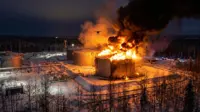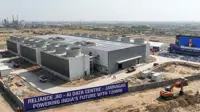RIL gets partners BP, Niko to fight government
20 Mar 2014
Reliance Industries Ltd (RIL) expanded the ambit of its arbitration with the government over, what it claims, its huge investments in the KG-D6 gas block in the eastern offshore that has only helped to reduce gas production from the D1 and D3 fields to a tenth of the initially projected 80 million standard cubic metres per day, by making its partner Niko Resources and the new stakeholder BP as parties to vouch for it.
Reliance argues that was purely because of unanticipated geological complexities such as a drop in reservoir pressure and ingress of water and sand.
RIL had dragged the petroleum ministry to arbitration in 2012 for not allowing $1.8 billion of its so-called investments into flagging production, in line with the production sharing agreement.
Sector regulator Directorate General of Hydrocarbons (DGH) has been of the view that RIL was deliberately withholding production from the once prolific gas field in order to profit from increased prices later (See: DGH seeks $1.78 bn penalty on RIL for KG-D6 gas shortfall).
While Niko was an early partner of RIL in the exploration contract, BP is a late comer and was not party to the production sharing contract with the government. It is not known how and why BP be made a party to the arbitration now.
Niko Resources and BP have formally decided to join the Mukesh Ambani-led firm in the arbitration proceedings against the government as the two global majors will benefit from the gas price hike from 1 April if they are part of RIL's arbitration process (RIL, BP to double gas price on a $1.2 bn bank guarantee).
The union cabinet had, in December last year, stipulated that the new gas rate would apply to all domestic producers, with a special provision that for the eastern offshore KG-D6 block where the contractor has failed to honour production sharing agreement, the operator will have to give a bank guarantee equivalent to the incremental revenue it would get from the new rates, if production rises with price hike.
Under the new natural gas pricing system, recommended by the Rangarajan committee, the price of domestically produced natural gas is likely to go up to around $8.4 per million British thermal unit (mmBtu) beginning 1 April 2014 from $4.2 per mmBtu at present.
According to the petroleum ministry, the bank guarantee will cover the difference between the current gas price of $4.2 per mmBtu and the new rate of about $8.4 per mmBtu as per the earlier output projection.
The total shortfall in production from KG-D6 in the last four years is estimated at 154 million metric standard cubic metres per day (mmscmd).
The bank guarantee of around $9 billion will be encashed if it is proved that the company hoarded gas or deliberately suppressed production at the main Dhirubhai-1 and 3 (D1 and D3) fields in KG-D6, but, for that, the government and its regulator will have to prove that.
After the petroleum ministry imposed a penalty of $1 billion for the shortfall, RIL had initiated an arbitration process, which is pending.
While RIL agreed to the bank guarantee, the oil ministry felt the bank guarantees couldn't be taken from BP and Niko as they were not part of the arbitration, sources said.




















